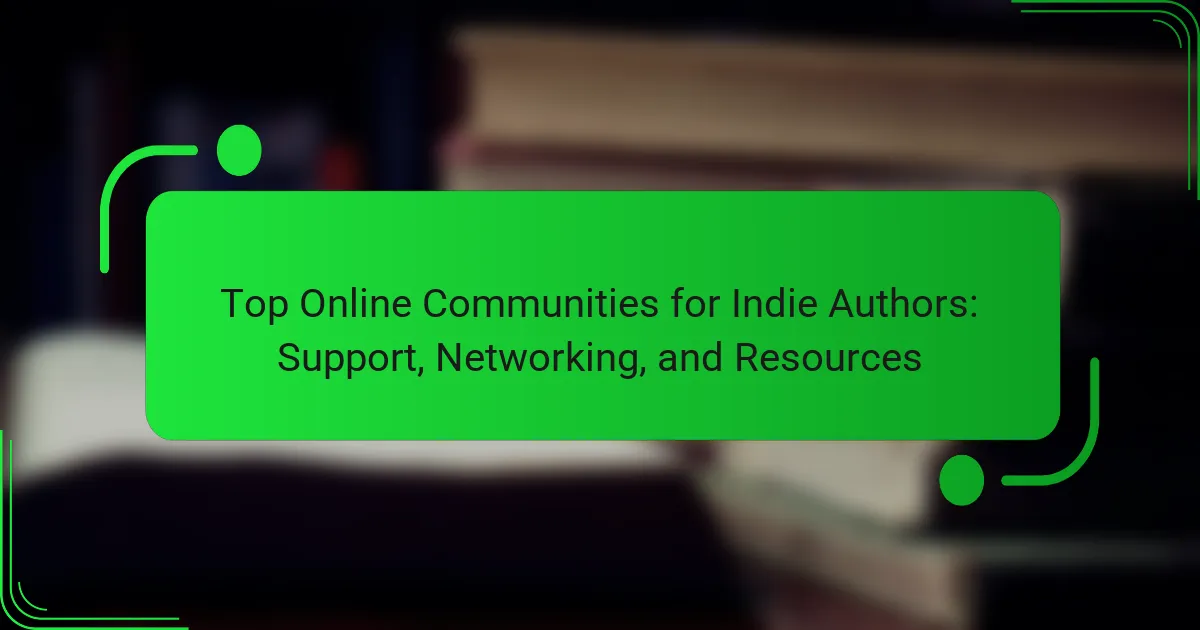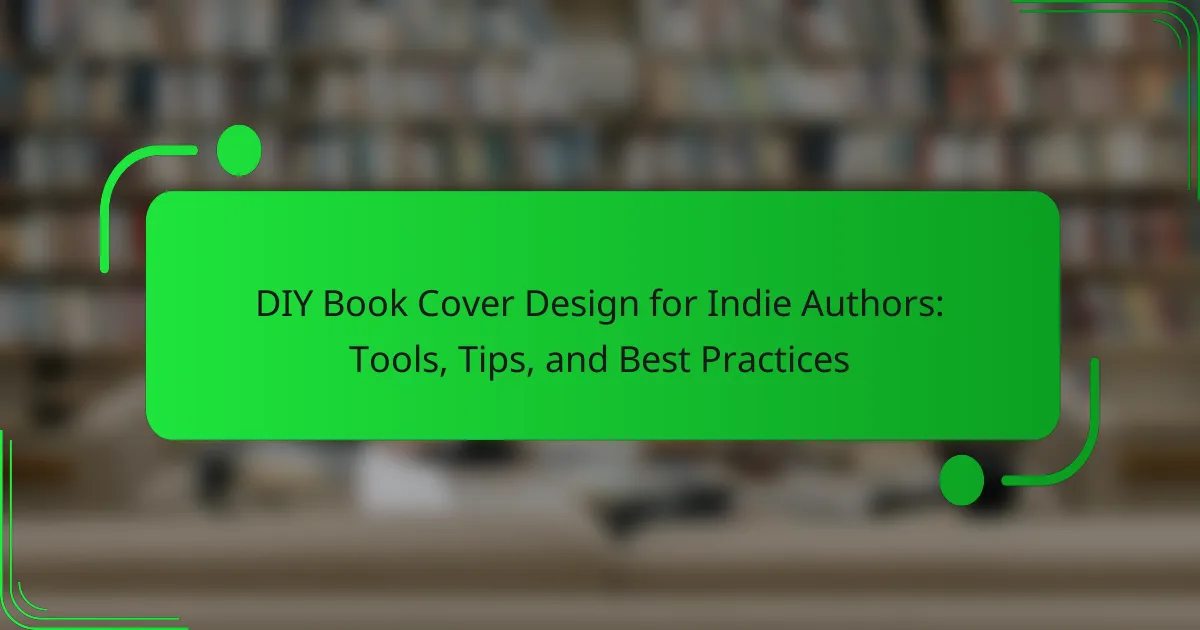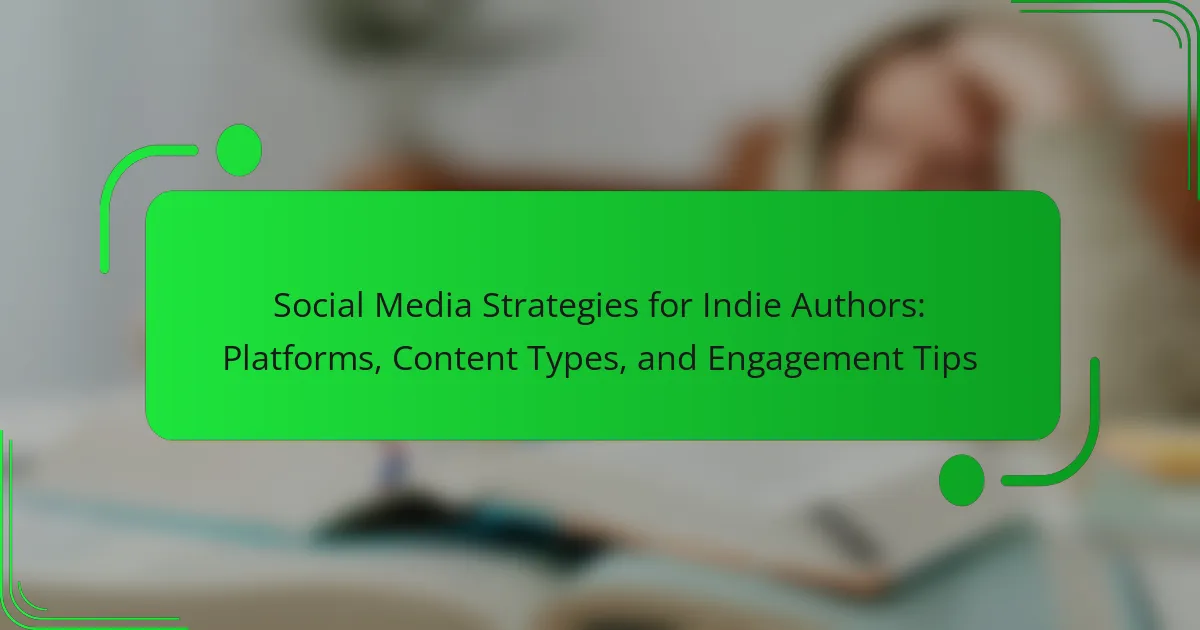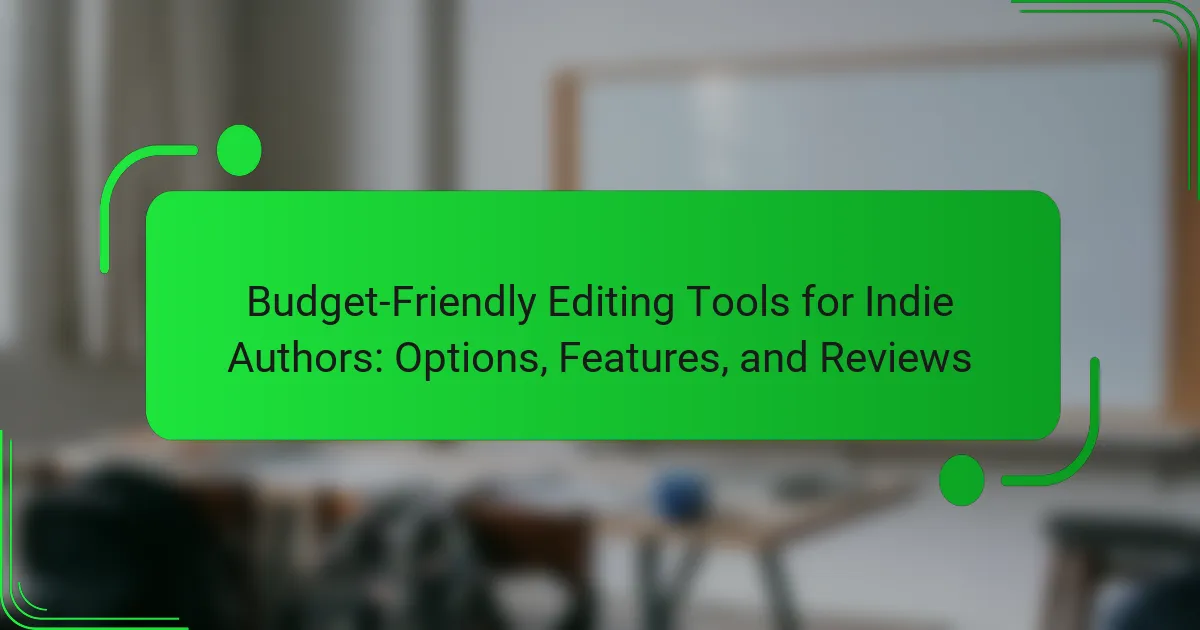Building an effective author website is crucial for indie authors to enhance visibility and connect with readers. This article covers essential tools and features like a professional homepage, engaging about page, and portfolio. It also addresses best practices for design, SEO optimization, and user engagement strategies. Additionally, we will explore common challenges indie authors face when creating their online presence.
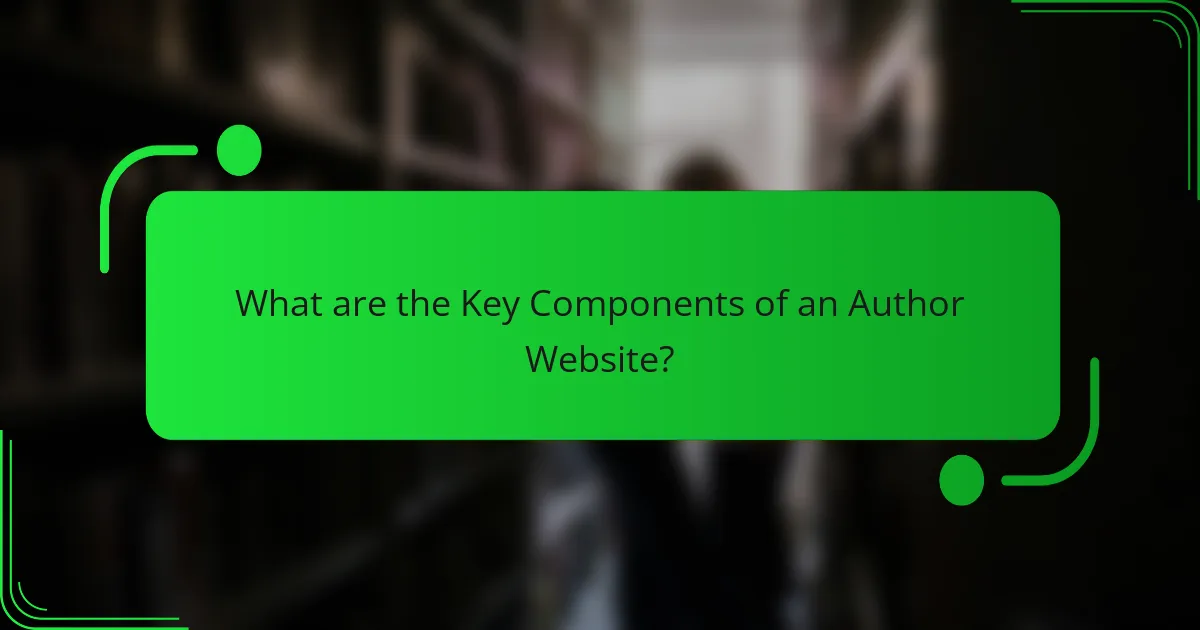
What are the Key Components of an Author Website?
An author website should include essential components such as a professional homepage, an engaging about page, a blog for updates, a portfolio showcasing work, and a contact page for reader interaction. These features enhance visibility and connection with the audience.
Key elements include:
1. Professional Homepage: Serves as the first impression and highlights key information.
2. About Page: Personalizes the author and builds reader trust.
3. Blog: Provides updates and engages with readers through content.
4. Portfolio: Showcases published works, enhancing credibility.
5. Contact Page: Facilitates communication with readers and industry professionals.
Each component plays a vital role in establishing an author’s online presence and promoting their work effectively.
How does Website Design Impact Reader Engagement?
Website design significantly influences reader engagement by enhancing usability and visual appeal. A well-structured website with intuitive navigation encourages visitors to explore content, resulting in longer visit durations. Key design elements, such as responsive layouts and fast loading times, directly impact user satisfaction. Studies show that 38% of users will stop engaging with a website if the content or layout is unattractive. Additionally, incorporating interactive features like comment sections can foster community and increase return visits. Overall, effective website design is crucial for indie authors aiming to connect with their audience.
Which Content Management Systems are Best for Indie Authors?
WordPress, Wix, and Squarespace are the best content management systems for indie authors. WordPress offers extensive customization and plugins, while Wix provides user-friendly design tools. Squarespace features elegant templates ideal for showcasing books. Each platform supports essential author website features like e-commerce, blogging, and analytics.
What Essential Features Should Every Author Website Include?
An author website should include an engaging homepage, an about page, a blog, a contact form, and links to social media. These features help connect with readers, showcase work, and facilitate communication.
1. Engaging Homepage: Captivates visitors and highlights latest works or news.
2. About Page: Shares the author’s background and writing journey.
3. Blog: Provides updates, insights, and engages readers with content.
4. Contact Form: Allows readers and industry professionals to reach out easily.
5. Social Media Links: Connects visitors to the author’s broader online presence.
How Can Authors Optimize Their Websites for Search Engines?
Authors can optimize their websites for search engines by implementing effective SEO strategies. Focus on keyword research to identify relevant terms that potential readers use.
Create high-quality, original content that engages visitors and encourages sharing. Optimize on-page elements like titles, meta descriptions, and headers to include targeted keywords.
Ensure your website is mobile-friendly and has fast loading times, as these factors influence search engine rankings. Use analytics tools to track performance and adjust strategies based on user behavior and preferences.
Regularly update your website with fresh content to improve visibility and encourage repeat visits.
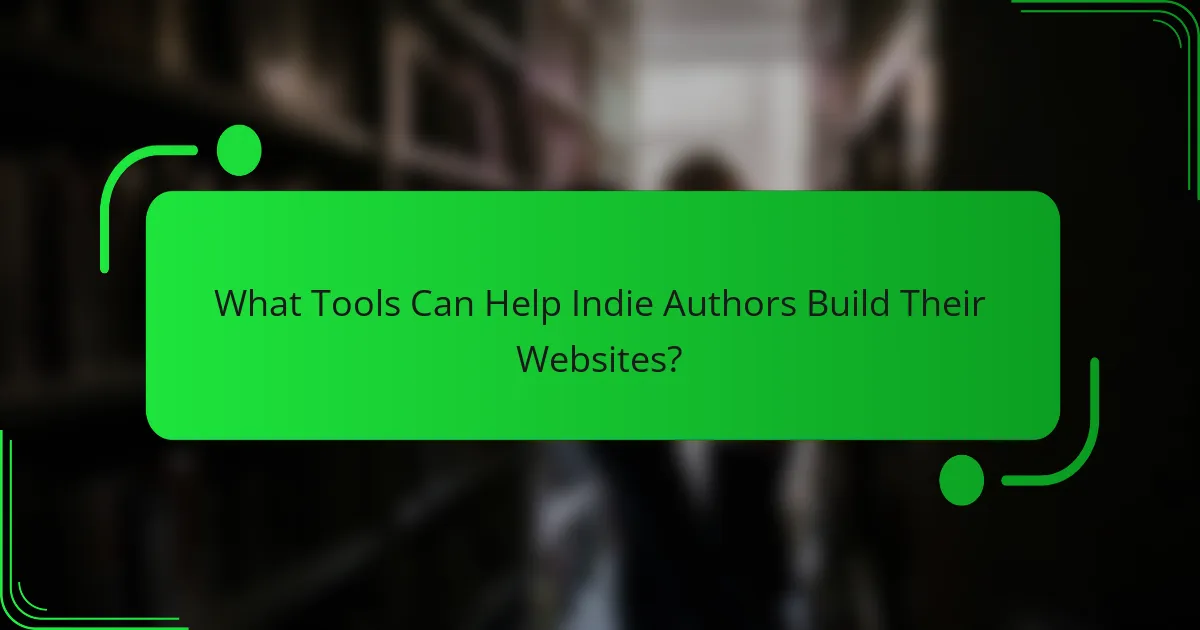
What Tools Can Help Indie Authors Build Their Websites?
Indie authors can use website builders, content management systems, and hosting services to create their websites. Key tools include WordPress for flexibility, Wix for ease of use, and Squarespace for design aesthetics. These platforms offer essential features like customizable templates, SEO tools, and e-commerce capabilities to enhance author visibility and sales.
Which Website Builders are Most User-Friendly for Authors?
Wix, Squarespace, and WordPress are the most user-friendly website builders for authors. These platforms offer intuitive interfaces, customizable templates, and essential features like blogging tools and e-commerce options.
Wix provides drag-and-drop functionality, making it easy for authors to create visually appealing sites. Squarespace is known for its sleek designs and integrated marketing tools, ideal for showcasing portfolios. WordPress offers extensive plugins and flexibility, catering to both novice and advanced users.
Each option supports essential attributes like SEO optimization, mobile responsiveness, and social media integration, enhancing an author’s online presence.
How Can Authors Leverage Social Media Integration on Their Websites?
Authors can enhance their websites by integrating social media, which fosters engagement and expands reach. First, include social media sharing buttons on blog posts to encourage readers to share content easily. Second, display social media feeds on the website to showcase real-time updates and interactions, promoting a vibrant online presence. Third, create dedicated pages for each social media platform, linking to profiles and providing followers with additional content. Lastly, utilize analytics tools to track social media traffic, helping authors understand audience preferences and optimize their strategies.
What Analytics Tools Can Track Author Website Performance?
Google Analytics, SEMrush, and Ahrefs are effective tools for tracking author website performance. These analytics platforms provide insights into traffic, user behavior, and SEO performance, enabling authors to optimize their online presence. Google Analytics offers real-time data and audience insights, while SEMrush and Ahrefs focus on keyword tracking and competitor analysis. Using these tools helps authors understand their audience and improve website engagement.
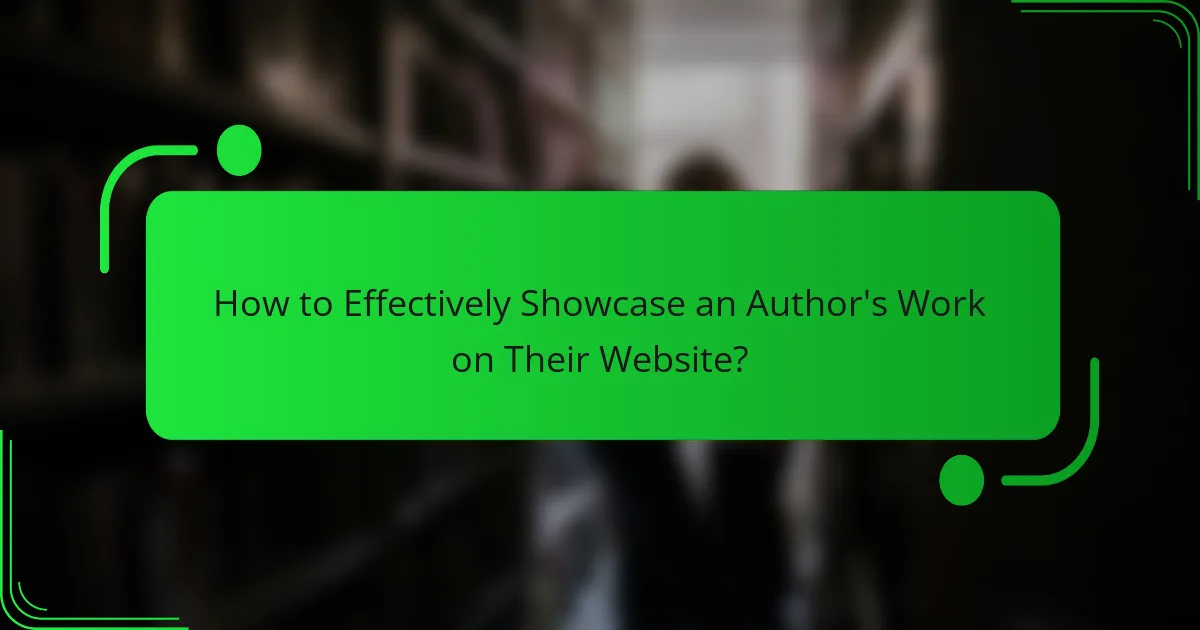
How to Effectively Showcase an Author’s Work on Their Website?
To effectively showcase an author’s work on their website, focus on clear organization and engaging presentation. Highlight key works prominently, utilize an attractive design, and ensure easy navigation.
1. Feature a dedicated portfolio section to display books and publications.
2. Include excerpts or samples to entice readers.
3. Add testimonials or reviews to build credibility.
4. Incorporate a blog for updates and insights into the writing process.
5. Ensure mobile responsiveness for accessibility on all devices.
6. Use social media links to encourage audience interaction and sharing.
What are the Best Practices for Displaying Published Works?
To effectively display published works, indie authors should prioritize clarity, accessibility, and visual appeal. Key practices include using a clean layout, categorizing works by genre or type, and ensuring mobile responsiveness.
Highlighting key attributes such as publication date, format, and a brief synopsis can enhance user engagement. Incorporating high-quality images of book covers alongside purchase links or sample chapters can further attract readers. Regularly updating the website with new works and testimonials builds credibility and keeps visitors returning.
How Can Authors Use Blogs to Connect with Their Audience?
Authors can use blogs to connect with their audience by sharing insights, experiences, and updates. This engagement builds trust and fosters a community around their work. Regularly posting content helps maintain visibility and encourages reader interaction through comments and social media shares. Additionally, authors can use blogs to showcase their personality, making their writing more relatable. Engaging with readers through Q&A sessions or feedback requests can further strengthen this connection.
What Role do Reviews and Testimonials Play on Author Websites?
Reviews and testimonials significantly enhance author websites by building credibility and trust. They provide social proof, encouraging potential readers to engage with the author’s work. Positive feedback can lead to increased sales and a loyal reader base. Moreover, authentic testimonials can differentiate an author in a competitive market. Engaging with reviews also fosters community and connection, reinforcing the author’s brand and presence.
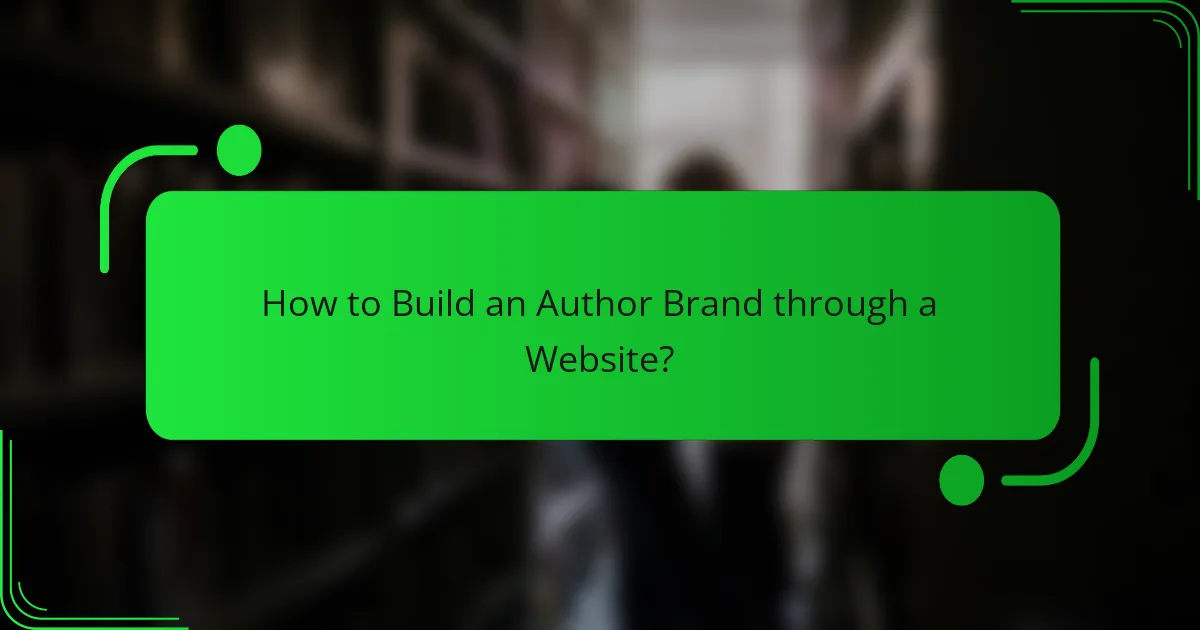
How to Build an Author Brand through a Website?
To build an author brand through a website, focus on key elements that showcase your identity and work. A professional design, engaging content, and clear navigation are essential.
Include an author bio, a portfolio of your writing, and a blog for updates. Utilize tools like WordPress or Squarespace for ease of use. Implement SEO strategies to enhance visibility.
Engage with your audience through email subscriptions and social media links. Regularly update content to keep your site relevant.
Lastly, ensure your website is mobile-friendly, as many users access sites via smartphones.
What Elements Contribute to a Strong Author Brand Identity?
A strong author brand identity is built through authenticity, consistency, and engagement. Authenticity fosters trust, while consistency in messaging and visuals reinforces recognition. Engagement with readers through social media and newsletters enhances connection and loyalty. Unique attributes, such as personal storytelling and niche focus, differentiate an author in a crowded market.
How Can Visuals Enhance Author Branding on a Website?
Visuals significantly enhance author branding on a website by creating a memorable and engaging user experience. High-quality images, graphics, and videos can convey the author’s personality and style, fostering a connection with the audience. Consistent visual elements, such as color schemes and fonts, reinforce brand identity across platforms. Additionally, visuals can highlight key achievements, book covers, and promotional content, making the website more appealing and informative.
Which Strategies Foster Community Engagement on Author Websites?
Engaging your community on an author website requires interactive features and consistent communication. Implementing a blog, hosting Q&A sessions, and utilizing social media integration fosters connection and encourages feedback.
1. Create a blog with regular updates to share insights and engage readers.
2. Incorporate a newsletter sign-up to maintain communication and share exclusive content.
3. Host live Q&A sessions to directly interact with your audience.
4. Use social media links to encourage sharing and community discussions.
5. Offer downloadable content, such as e-books or exclusive chapters, to incentivize engagement.
6. Encourage user-generated content, like reviews or fan art, to build a sense of community.
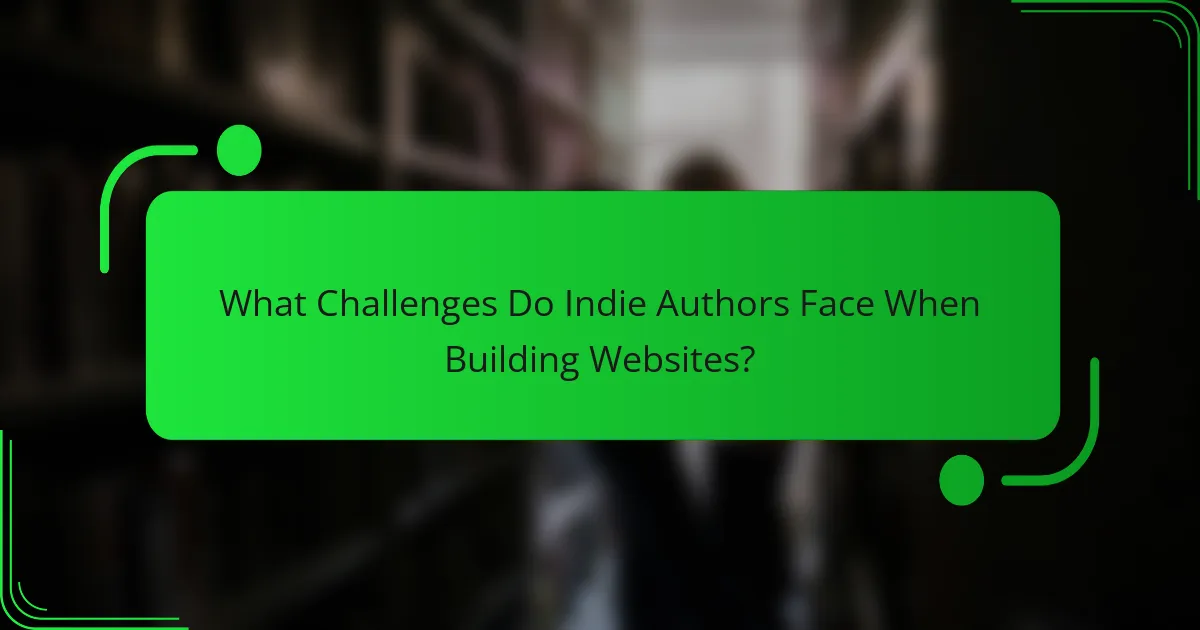
What Challenges Do Indie Authors Face When Building Websites?
Indie authors face several challenges when building websites, including limited technical skills, budget constraints, and time management. These obstacles can hinder their ability to create an effective online presence.
Technical skills are often a barrier, as many indie authors lack web development knowledge. This can lead to frustration when trying to implement essential features. Budget constraints also play a significant role; hiring professionals or purchasing premium tools can be financially challenging.
Time management is another critical issue. Balancing writing, marketing, and website maintenance can be overwhelming for indie authors. As a result, many may neglect their websites, missing out on potential reader engagement.
Lastly, ensuring the website aligns with branding and effectively showcases their work can be difficult. A cohesive design and user-friendly navigation are essential for attracting and retaining visitors.
How Can Budget Constraints Affect Website Development Choices?
Budget constraints significantly influence website development choices for indie authors. Limited funds can lead to prioritizing essential tools and features, impacting design and functionality.
Indie authors may opt for cost-effective platforms like WordPress or Wix, which offer templates and plugins. They might also choose to limit customizations or features to stay within budget. As a result, some may forego advanced functionalities like e-commerce or membership systems, focusing instead on core elements such as an author bio, book listings, and a blog.
In terms of design, authors might select simpler layouts to reduce costs associated with hiring developers. This approach can streamline the development process but may limit uniqueness. Balancing budget constraints with essential features is crucial for creating an effective author website that meets readers’ expectations.
What Technical Skills are Necessary for Managing an Author Website?
To manage an author website effectively, technical skills in web design, content management systems, and SEO are essential. Proficiency in HTML and CSS enhances customization, while knowledge of platforms like WordPress streamlines site management. Familiarity with analytics tools helps track performance and user engagement.
How Can Authors Overcome Common Website Maintenance Issues?
Authors can overcome common website maintenance issues by implementing regular updates, utilizing reliable hosting services, and employing user-friendly content management systems. Regularly updating plugins and themes enhances security and functionality. Reliable hosting minimizes downtime and improves site speed. User-friendly content management systems simplify updates and content creation.
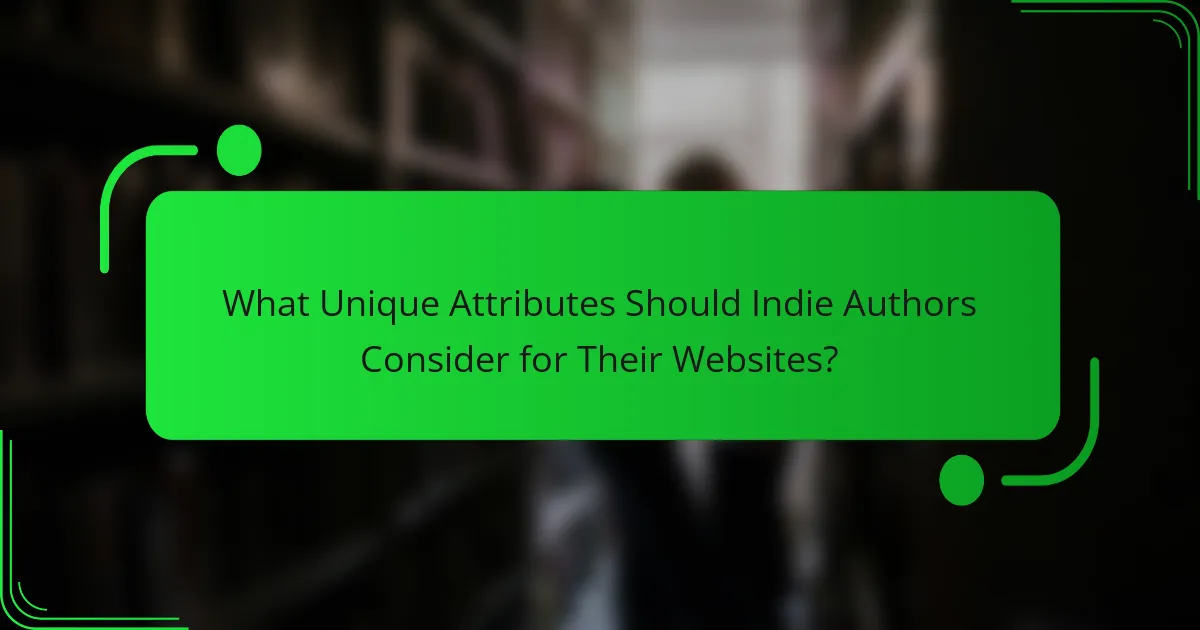
What Unique Attributes Should Indie Authors Consider for Their Websites?
Indie authors should consider unique attributes like personalized branding, optimized SEO features, and user-friendly design for their websites. These elements enhance visibility and engagement. Incorporating a blog can showcase expertise while offering a unique voice, attracting a dedicated audience. Interactive elements, such as newsletters or social media integration, foster community and maintain reader interest.
How Can Personal Stories Enhance Connection with Readers?
Personal stories enhance connection with readers by fostering authenticity and relatability. They allow authors to share experiences that resonate emotionally, creating a bond. This connection encourages reader engagement and loyalty, essential for indie authors building their platforms. Personal narratives can also illustrate themes or messages, making content more memorable and impactful.
What Innovative Features Can Differentiate an Author Website?
Innovative features that can differentiate an author website include interactive elements, personalized content, and integrated social proof. These features enhance user engagement and showcase the author’s unique brand.
1. Interactive elements: Incorporating quizzes or polls can engage visitors and encourage them to explore more content.
2. Personalized content: Tailoring recommendations based on user behavior can create a unique experience for each visitor.
3. Integrated social proof: Displaying reviews, testimonials, or media mentions can build credibility and trust with potential readers.
4. Multimedia showcases: Using video or audio snippets of readings can provide a richer understanding of the author’s work.
5. Community forums: Facilitating discussions among readers fosters a sense of belonging and encourages return visits.
6. Dynamic updates: Regularly changing content, such as blog posts or news, keeps the site fresh and encourages repeat visits.
How Can Authors Utilize Multimedia to Engage Visitors?
Authors can utilize multimedia to engage visitors by incorporating images, videos, and audio clips into their websites. These elements enhance storytelling, provide visual interest, and create immersive experiences for readers.
Images can showcase book covers, author events, or thematic visuals related to the content. Videos, such as book trailers or author interviews, can convey emotion and personality, fostering a deeper connection with the audience. Audio clips, including readings or podcasts, allow visitors to experience the author’s voice and style, making the content more relatable.
Integrating these multimedia elements can significantly boost user interaction and retention, ultimately leading to a more successful author website.
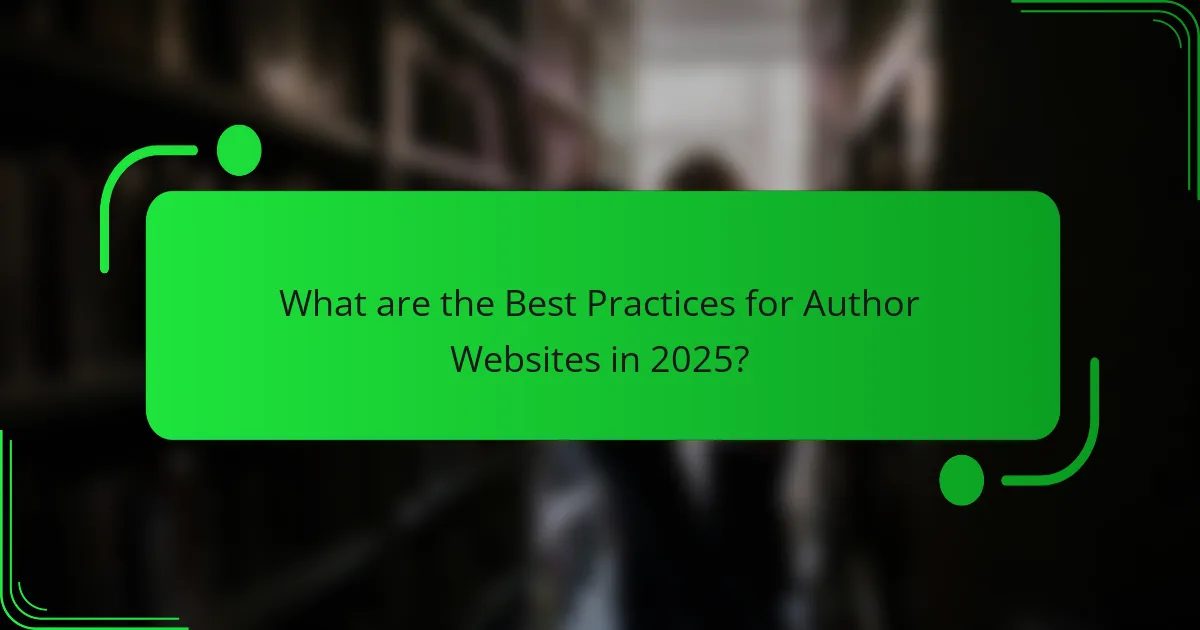
What are the Best Practices for Author Websites in 2025?
To create an effective author website in 2025, focus on user experience, mobile optimization, and SEO. Incorporate a clean design, easy navigation, and engaging content to attract readers.
Key features to include are a blog for updates, an email newsletter signup, and links to social media. Utilizing analytics tools will help track visitor behavior and optimize content.
Consider integrating e-commerce capabilities for selling books directly. Ensure fast loading times and accessibility for all users.
Regularly update content to keep the site relevant and engaging, enhancing both user experience and search engine ranking.
How to Ensure Mobile Optimization for Author Websites?
To ensure mobile optimization for author websites, prioritize responsive design and fast loading speeds. Use mobile-friendly themes and formats that adapt to various screen sizes. Optimize images and minimize scripts to enhance performance. Regularly test the site on multiple devices to ensure usability and accessibility.
What Common Mistakes Should Indie Authors Avoid When Building Their Websites?
Indie authors should avoid common mistakes like neglecting mobile optimization, underestimating the importance of a clear author brand, and failing to include essential features such as a blog or email sign-up form. These errors can hinder audience engagement and website effectiveness.
1. Neglecting mobile optimization can alienate a significant portion of potential readers who access websites via smartphones.
2. Underestimating the importance of a clear author brand leads to confusion about the author’s identity and offerings.
3. Failing to include a blog limits opportunities for content marketing and connecting with readers.
4. Not incorporating an email sign-up form misses chances to build a mailing list for future book releases and updates.
5. Overlooking SEO practices can result in poor visibility in search engine results, reducing traffic to the site.
6. Ignoring analytics prevents authors from understanding audience behavior and improving their website strategy.
How Can Authors Keep Their Website Content Fresh and Relevant?
Authors can keep their website content fresh and relevant by regularly updating with new articles, engaging with readers, and utilizing analytics. Consistent blogging about writing tips or personal experiences enhances audience connection. Incorporating feedback and trends ensures the content remains timely. Additionally, updating older posts with current information or insights can improve SEO and maintain relevance.
What Expert Tips Can Enhance an Author’s Online Presence?
To enhance an author’s online presence, focus on creating a professional website with essential features. Include a blog for content sharing, an email newsletter for audience engagement, and social media integration for broader reach. Optimize the site for SEO to improve visibility and utilize analytics tools to track performance. Regularly update content to keep the audience engaged and showcase your work effectively.
